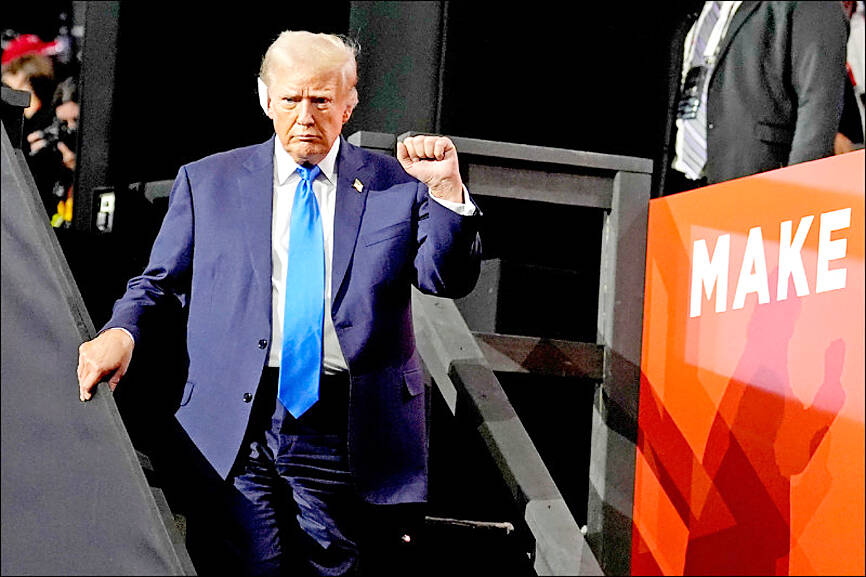The US-based Center for Strategic and International Studies (CSIS) think tank on Thursday held an online forum aimed at understanding public opinion in Taiwan, with a focus on Taiwanese views on the US, US-China relations and cross-strait relations, based on data gathered by Academia Sinica’s Institute of European and American Studies “American Portrait” survey.
The survey, which was conducted in May, showed that about 46.2 percent of respondents said that former US president and Republican Party presidential candidate Donald Trump’s election would have an impact on the US’ willingness to defend Taiwan, while 37.5 percent of respondents said Trump’s election would increase the US’ willingness to defend Taiwan.
Institute assistant research fellow James Lee (李語堂), a participant in the CSIS forum, said: “People think that Trump being elected would have an impact on US willingness to defend Taiwan, but they don’t have a consensus on whether it would decrease or increase the US commitment to Taiwan.”

Photo: AP
Perceptions of Trump’s impact on US policy are strongly influenced by partisanship and national identity, Lee said.
About 41.2 percent of respondents said they felt that the US was credibly reliant, up from 33.9 percent last year, the survey showed.
Meanwhile, 80.9 percent of respondents said that China was not credible. However, the number of respondents finding China credible rose from 9.3 percent last year to 12.5 percent this year.
As US credibility is hinged on strategic ambiguity, it is difficult for Taiwan to gauge the authenticity of the US’ credibility, Soochow University Department of Sociology assistant professor Pan Hsin-hsin (潘欣欣) said.
The survey showed that 83.4 percent of respondents found that Chinese threats have increased, while 70.4 percent said that continued growth of Chinese military equipment might increase the risk of China militarily invading Taiwan.
Additionally, 59.6 percent of respondents believed the US would militarily intervene in a potential conflict, the survey found.
For the first time since they survey’s launch in 2021, it asked whether respondents were willing to take up arms in defense of their country, which yielded a response of 53.5 percent of affirmative responses.
It also found that 71.8 percent of respondents felt that increased air and naval patrols in the Taiwan Strait would increase the possibility of the US militarily assisting Taiwan.
Institute research fellow Wu Chien-huei (吳建輝) said there was optimism about Trump winning the election, but his transactional approach to politics lent significant credence to the US skepticism.
The survey, held between May 23 and May 28, used computer-assisted phone interviews to interview adults aged 20 and above, yielding valid samples numbering 1,236 with a level of confidence of 95 percent.
Additional reporting by CNA

Taiwan is stepping up plans to create self-sufficient supply chains for combat drones and increase foreign orders from the US to counter China’s numerical superiority, a defense official said on Saturday. Commenting on condition of anonymity, the official said the nation’s armed forces are in agreement with US Admiral Samuel Paparo’s assessment that Taiwan’s military must be prepared to turn the nation’s waters into a “hellscape” for the Chinese People’s Liberation Army (PLA). Paparo, the commander of the US Indo-Pacific Command, reiterated the concept during a Congressional hearing in Washington on Wednesday. He first coined the term in a security conference last

DEFENSE: The National Security Bureau promised to expand communication and intelligence cooperation with global partners and enhance its strategic analytical skills China has not only increased military exercises and “gray zone” tactics against Taiwan this year, but also continues to recruit military personnel for espionage, the National Security Bureau (NSB) said yesterday in a report to the Legislative Yuan. The bureau submitted the report ahead of NSB Director-General Tsai Ming-yen’s (蔡明彥) appearance before the Foreign and National Defense Committee today. Last year, the Chinese People’s Liberation Army (PLA) conducted “Joint Sword-2024A and B” military exercises targeting Taiwan and carried out 40 combat readiness patrols, the bureau said. In addition, Chinese military aircraft entered Taiwan’s airspace 3,070 times last year, up about

A magnitude 4.3 earthquake struck eastern Taiwan's Hualien County at 8:31am today, according to the Central Weather Administration (CWA). The epicenter of the temblor was located in Hualien County, about 70.3 kilometers south southwest of Hualien County Hall, at a depth of 23.2km, according to the administration. There were no immediate reports of damage resulting from the quake. The earthquake's intensity, which gauges the actual effect of a temblor, was highest in Taitung County, where it measured 3 on Taiwan's 7-tier intensity scale. The quake also measured an intensity of 2 in Hualien and Nantou counties, the CWA said.

The Overseas Community Affairs Council (OCAC) yesterday announced a fundraising campaign to support survivors of the magnitude 7.7 earthquake that struck Myanmar on March 28, with two prayer events scheduled in Taipei and Taichung later this week. “While initial rescue operations have concluded [in Myanmar], many survivors are now facing increasingly difficult living conditions,” OCAC Minister Hsu Chia-ching (徐佳青) told a news conference in Taipei. The fundraising campaign, which runs through May 31, is focused on supporting the reconstruction of damaged overseas compatriot schools, assisting students from Myanmar in Taiwan, and providing essential items, such as drinking water, food and medical supplies,